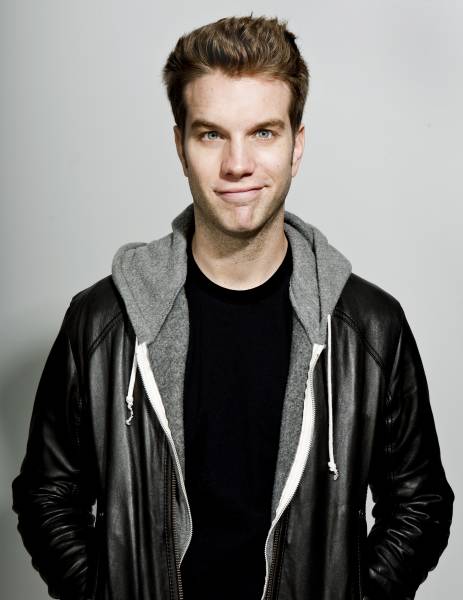Comedy Q+A: Anthony Jeselnik
 Photo of Anthony Jeselnik by Natalie Brasington
Photo of Anthony Jeselnik by Natalie Brasington
Anthony Jeselnik, the TV writer and comedian who has become a favorite on the Comedy Central “Roasts,” is coming to Boston’s Wilbur Theatre for a late show performance this Saturday night. This performer has made a name for himself by honing his unapologetic persona at New York’s notorious/lauded Comedy Cellar. In the last year, many comics have come under fire for “going too far” with edgy or “offensive” jokes and opinions: Tracy Morgan’s “homophobic rant,” Jo Koy’s “homophobic rant,” Amy Schumer’s “too soon” joke about a drunk driver, “Letterman” booker Eddie Brill’s firing for his “attitude” about female comics, Adam Carolla’s rant about female comedy writers not being funny, Daniel Tosh’s “rape joke” heckler incident, and Dane Cook’s jokes about the Aurora shooting, to name a few. Some of these comedians have lost their jobs or been forced to issue clarifying statements about their jokes, some of which could be classified as offhand remarks, at best. Media has glommed onto these stories, eager to fan an illegally taped video into a flame of controversy, with the Huffington Post as one of the worst offenders in the cases listed above.
Anthony Jeselnik isn’t too concerned about these incidents or the resulting controversy. The comedian, who spent a year writing for “Late Night with Jimmy Fallon,” told us that he focused on nuances in language and that it took up to seven years before he could craft an offensive joke about rape that resulted in audience laughter and acceptance instead of groans. The trick is to “be attentive” and “take the audience into consideration” when going down that path. Because of our current culture of complaint, Jeselnik says he would like to “educate the audience” on what comedy is all about, and how to act when they go to a club. Boston will get the chance to earn a grade or two at Jeselnik’s Wilbur show where he will unveil his recently recorded hour, titled Caligula and set for release on Comedy Central in January, along with a huge chunk of new supplementary material. For more information on Jeselnik, check out his website and follow him on Twitter.
When’s the last time you came to Boston to perform?
Anthony Jeselnik: You know, it’s been a long, long time. It’s tough to get to Boston— you don’t really have a lot of clubs to bring people in that much. I performed there once when I first started doing stand-up at a place called The Comedy Studio where they let me do some sets. They were really great to me over there. That’s been the only time I’ve been to Boston. I’ve really wanted to go—Boston is one of those great comedy towns. I’m excited about finally being able to come to do The Wilbur. Boston has such a rich comedy scene, people like the local comics, and then the bigger acts make it in there at The Wilbur.
You mention Massachusetts in your recent album Shakespeare, a town called Great Barrington, in which people didn’t respond to a suicide joke you made. Did this really happen?
It’s pretty true, I fudge a little bit for comedic purposes. I forget the name of the bar, but I was asked to come up and do their comedy night, and in the middle of the show, I told this suicide joke and it just fell completely flat, which I thought was weird. Nobody said anything, so I kept going with my set and everything was good. Then afterward I was talking to a couple of people who were kind of laughing at me, so I asked, “What happened with that [suicide] joke? Did I tell it before? Did everybody know it or something?” And they said, “No, we just have a lot of suicides here.” So I changed the bit to call Great Barrington “the suicide capital of the country.” Now I get letters all the time from people in Great Barrington who keep telling me about what a nice place it is and where the actual suicide place is and I could not care less.
You’ve built up a great reputation as an excellent club comic from your tenure at the Comedy Cellar, where the audience is so intimate, literally at shin height—what do you do to prepare your set for a theater show like The Wilbur, where the audience just keeps on going and going, with balconies and everything?
You know, I don’t have to do that much. I think a theater show is a pure version of me doing my material. The theater crowd is a bit more polite, there really aren’t hecklers, and there are a lot of people there to see me, and they’re excited about the jokes and hanging out with me for a show. When I do a show at the Cellar, people are there to see comedy, people might not even know I’m on the bill, and that’s something to overcome right at the beginning.
What is your perspective on the various “controversies” that have happened in comedy recently? We have these examples of comedians doing a show in a club, doing some edgy material, and patrons of the club are recording a clip and putting it online. I’ve heard some comics complain that they are trying out new material, or that a bit is taken out of context.
It’s made me a bit angry and I think it’s a bit ridiculous because some people just don’t know what comedy is. This seems to have happened recently—people think they are owed an apology for things. Like the Tracy Morgan thing, he was doing that material for years. That gay joke in question was on his HBO special, and one guy decided that the thing was wrong because he wanted an apology for himself. Then there’s the Daniel Tosh thing which wasn’t even recorded—it was some girl who told her friend about it and then her friend wrote a blog [post]. That’s the worst way you can hear about comedy material: from a third person’s blog story that they wrote when they were upset. They want an apology, which is insane.
Being offended doesn’t mean anything, you’re just complaining. When someone says, “I’m offended by that,” it doesn’t mean a thing to me. If someone says, “That’s not funny,” which has become the new battle cry, what people are actually saying is “That’s not funny…to me.” No one can know what’s funny and what’s not because everyone laughs at different things. Everyone is saying “That’s not funny to me,” but they’re leaving off the “to me” at the end because when you say that, you sound like an idiot. People just decide that they are the ones between what’s OK and what’s not, and that’s ridiculous. If comedy worked that way, nobody would want to see comedy, ever.
I think if you’ve got a choice of seeing two different comedians, and you ask, “What are these comedians like?” And you’re told, “This one over here really cares about people’s feelings. He doesn’t want to upset anyone, he wants everyone to laugh and have a good time, and he’ll do whatever it takes to make that happen. Then this comedian over here doesn’t give a damn, tries to cross every line that he can and really uses comedy to break down limits and interest people in the worst thing in the world.” You’re not wrong in deciding one or the other, but I know which one I would go see. If you don’t like it, just leave, we don’t need to hear from you.
There is a culture of complaint that has come about since the whole political correctness movement that started in the mid-’90s, but now we have social media that provides immediate access to people with complaints. Everyone has a megaphone and most people don’t seem to be able to speak correctly into it.
Exactly, there is no integrity regarding comments on the Internet. If someone writes “Anthony Jeselnik told me he hopes my baby gets raped to death,” that becomes fact to certain people. If I put a video online and 10,000 people watch it, and one person leaves a comment on it, and it’s a negative comment, then everyone assumes that the video is a failure because that’s the only comment there. It’s dumb, very, very dumb. I heard an argument about the Daniel Tosh thing and the Dane Cook joke: “Well, Jeff Dunham gets away with it because Jeff Dunham isn’t saying it, it’s his puppets that are saying the bad stuff.” I’m not an idiot because I know that’s Jeff Dunham talking. People will go after Daniel Tosh’s rape joke, and then say, “This rape joke is OK because Louis C.K. said it,” which is insane. They have a mouthpiece, and they feel like they have a need to be heard. Just because you are offended doesn’t mean anything—there’s no reason to listen to you more because you’re upset.
What do you have to say to comics who are starting out, who admire what you do, and who try to be as offensive and as “edgy” as possible, and who are failing at it?
I think it’s very attractive to be on that cutting edge. When you’re starting out, you want to be pure. For me it took a long time to be able to be as edgy as I am now, but to do it in a smart way. It took me about six or seven years to tell a rape joke on stage that actually got a laugh. I think that the rape jokes that I have are defendable, but when you start out, you just have to fail a lot before you understand [how to write these]. I don’t think people shouldn’t try to be edgy, but you have to take what the audience says to you in consideration. I have a couple jokes that I say that nobody laughs at, but I know that I like these jokes, and in an hour set, I can afford to have a few jokes that don’t hit but are OK because I believe in them. It’s OK, the audience doesn’t always have to laugh, but you can’t have more than a couple of those, and I’ve earned to have those in a long show.
People have asked me about my influence on young people, and I think that it’s possible that I’m ruining a generation of comedians. I don’t feel a concern about that, I don’t feel that I owe anybody anything in terms of that—but tread carefully if you are going to try to be like me. I’m not just offensive, I’m very smart about the way that I do it, and that takes a lot of time. People say that young comics shouldn’t be trying these things. That’s ridiculous. You should try everything and see what sticks. But be attentive to the audience because you’re not doing yourself any favors. Nobody wants to see somebody go up and be brutal for an hour unless you’re being smart and doing it in an interesting way.
We’re going to be getting a big chunk of time from you this weekend. How did you go about putting together what you’ll be sharing with us on Saturday?
As soon as I recorded Shakespeare, I began switching jokes out to build the next hour. So I recorded a new hour in June in Chicago for an upcoming hour special to be released on Comedy Central and as an album in January, called Caligula. When I finished that in June, I started putting in new jokes again. So what you’ll see this weekend is the new hour, Caligula, but with new jokes already in there. I’m also reordering stuff, but it will all be stuff that nobody has seen before. Then at the end, I just tell the most offensive jokes that I have. These are jokes that I call “showstoppers” because they were really funny to me, but when I would say them it would take another two jokes to get the audience back. So now I put them at the end and I tell the audience what’s about to happen.
Anthony Jeselnik is a comedian performing at The Wilbur Theatre on Saturday, August 18, at 10 p.m.


